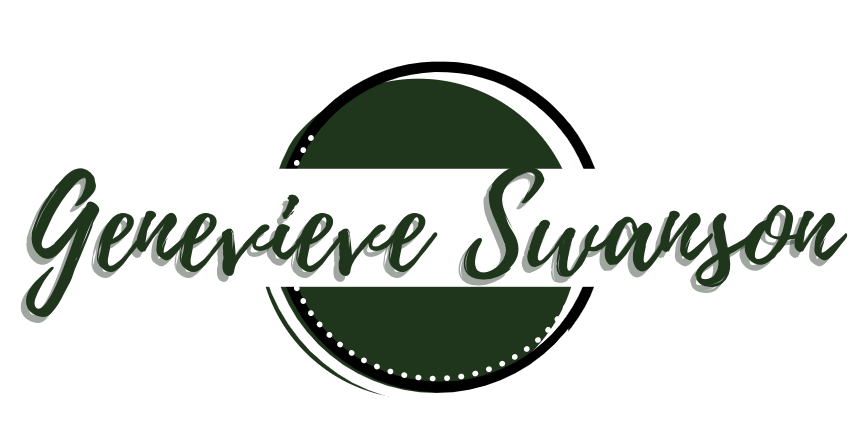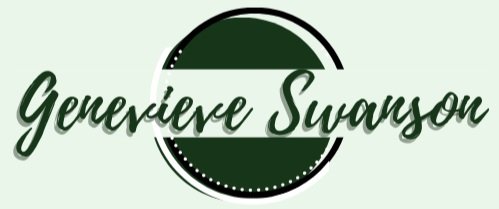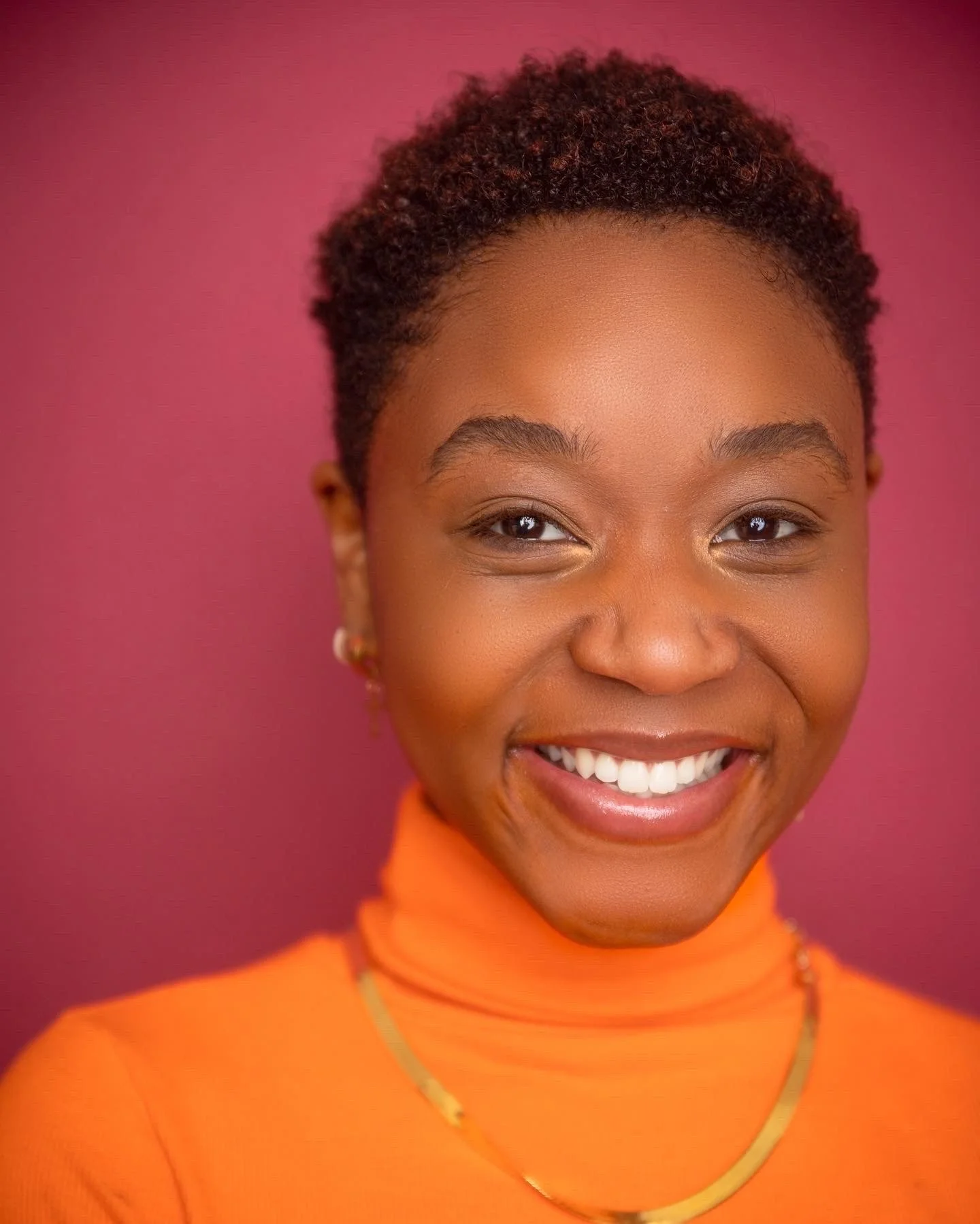An Interview with Ashli René Funches - What is Gen Z Theatre?
Ashli René Funches
Ashli is currently working as an Actor, Educator, and Florist. They are from Birmingham, Alabama but she considers Chicago her artistic home. Ashli’s recent credits include: IS GOD IS (Red Orchid), Notes from the Field (Timeline), Stew (Shattered Globe), and Detroit 67 (The Theatre School). They will be portraying Bessie and others in Lifeline’s Native Sun starting on May 10th. Ashli received their BFA in Acting and an BA in African Diaspora from DePaul University. She wrote, produced, and portrayed Amari in the film, A yellow circus. Ashli also portrays Z in a feature entitled, The lapse. Both films are set to premiere in 2024.
2/27/2024
GENEVIEVE: Hi! I'm glad we got through, how are you?
ASHLI: I'm having a crazy day, but I'm doing well.
GENEVIEVE: Yeah, what are you up to?
ASHLI: I am observing classes for Writers Theater right now.
GENEVIEVE: That’s amazing! Thank you for taking time out of your day for this interview. I wanted to get people from different disciplines for these interviews and after seeing Notes from the Field the other night and seeing that you were involved with it, I was like “Why don't I just ask Ashli?” So thank you! Could you start by introducing yourself, how you got into theater and what you're doing now?
ASHLI: Thank you for thinking of me for this. My name is Ashli René Funches. I use any pronouns. I got into theater… I was in high school. I was in Alabama. There was like no theater programs, but I got thrown into one. So I have been doing it since then. What I'm doing now… So I'm an educator and I'm an actor. I'm represented by DDO. I'm understudying Notes from the Field and I'm working with a ton of theaters in education. I'm working with Pegasus Theater and we go around and do this like touring show trying to get kids to write. Basically it’s this youth playwriting festival, so you try to get them excited. We go do an excerpt from one of those shows and we show the kids. And then I am an Educational Apprentice at Writers Theater. So just like learning how they do curriculum and stuff like that… And then I'm a Teaching Artist with Lifeline, so there you just go into a school and you teach kids theater. Yeah, that's what I'm doing now.
GENEVIEVE: That's so exciting. I had one of those playwritin touring group at my public school in third grade and here we are now! So for yourself, as an artist and creator, and you could even go into education if you wanted, what values do you hold as a theater artist?
ASHLI: Yeah, I'm pretty strict with my values. It’s, for lack of a better term, eating my ass. I got BFA in Acting from DePaul with a double major in African diaspora studies. So, I have the ethos of, “If it's not advocating- if it's not creating change, I'm not gonna do it.” So that's kind of why I found my home more so in education. Because that feels like that's where the most change is happening in theater. Where you're trying to reach students and especially because you're doing theater within capitalism. You know what I mean? So for a lot of the audiences that are seeing [non-TYA theater], you're not changing their thoughts. Even if you're doing theater that is anti-imperialist, a lot of times you're just giving liberal rich white people what they want to hear. So I go into schools because that's a place where theatre is educational and empowering. It's not just regurgitation of what somebody may already know.
GENEVIEVE: Some very valid points. I'm glad to hear that you're getting to stick to those values. Going off of tha,t what kind of impact do you hope to make with the art that you are a part of?
ASHLI: Oh, that's a really great question. I think theater was really life-changing for me. I was starting to touch on this but, I grew up in Alabama where a lot of investment in the arts is not prioritized. The only reason I was even exposed to theater was because I went to a new high school where they were just trying out things. I think for me, growing up I kind of didn't think I was good at anything until I did theater. Then I was like, oh, okay, this is not a competition. This is a place to express yourself. That's something that kind of plagued me throughout is. This idea of competition and rejection. When you're in a conservatory environment it feels like it's a competition- and it's rejection, and then you get an agent, and you're auditioning. I feel very serious about trying to create spaces where theater is not about that. Theater is something used to show people that this is not a place where you have to practice capitalism all the time. It's a place where you can be in community and try to find your voice. That's really something that I'm invested in: finding your voice, finding your body, and figuring out ways to use it that's not just in terms of progression or advancement, or career-based. More so, how do we just enjoy our bodies and our voices? Have a good time like take a second to breathe. That's what I really feel passionate about doing. I'm trying to figure out how to do that.
GENEVIEVE: Yeah, that's really beautiful. That's something I hear from a lot of people in our generation: having this frustration with capitalism and art. We are trying to find this third option of doing art without it being capitalist, but still stay alive and make a living. It’s exciting to hear you talk about it with the hope and excitement of figuring it out. I know that you also were working on your own film, is that correct?
ASHLI: Oh yeah, I'm working on a film. It's called A Yellow Circus. It's like 40 minutes long. We are currently at the end of that creation… Ideally we're submitting to film festivals and we're reopening an Indiegogo but it's been a lot of patience, having no money, and figuring out how you can do this in a communal way... That's been the biggest thing right now.
GENEVIEVE: In our generation I have noticed that there are many multidisciplinary artists interested in multimedia. So, I was curious about how your work in film has informed your theater work or vice versa.
ASHLI: My film… I feel like a lot times I’m just thrown into things. Film happened because of the pandemic. I don't know if I care very much for film. It's just more so that's where the money is (not my film). Film has impacted my theater work because I think in film you can't control anything about it. Especially as the actor, you definitely can't. I do think there's a certain agency in theater that an actor has, or an artist has that you don't have in film because it's just not about you. Film is much more about “the camera” or the technical aspects of it. The presence that I have learned from film and the patience that I have learned has really helped me as an artist.
GENEVIEVE: Going back to theater, now that you're working with these larger, established storefronts like Timeline and Writers theater, are you finding that any of your views on theater are being changed or challenged?
ASHLI: Yeah, I guess I'm really tired of the audience in theater. The audience in theater is really white, and it's not even just white. I'm noticing that it's it's older. It's money. It's about access and I don't enjoy that. So that's kind of changing. I also feel like actors are not paid the way we should be. Chicago's very like blue-collar, which is cool. That's really awesome, but as an actor, I it would be nice to be able to eat. I’m nearing my wits end with theatre because you have to be so dedicated. [It’s hard] to see audiences that are not necessarily life-changing or where you don't feel like you're reaching a broad base of people. That's that's changed my opinion and has pushed me more towards film, because the audiences are more accessible. At the same time, Chicago actors and Chicago theater makers are some of the most dedicated people I've ever met. I'm learning a lot from the people who are practicing this and are dedicating their time to it. I've really enjoyed seeing how diligent these people are and not for the money. I mean that's probably the best part.
GENEVIEVE: It's hard because you can't have one without the other. You want to have this nice balance and find the sweet spot of it because we all deserve to get paid. Theatre deserves audiences outside of the narrow demographic that has been going to theaters for so long. In that vein, and what do you hope that the future of theater looks like?
ASHLI: I hope that we get some more marketing people in theater that are able to market to a wider audience… But how do we become the most accessible and communal space that there is? Because that is the best part about theater. We turn our phones off and we lock in together as a community. I hope that theaters are really leaning into that. I know I keep talking about wanting more money, but I guess being poor is fine as long as the audience looks a little bit different.
GENEVIEVE: Yes, maybe we can live in a world where we can have both. That would be beautiful.
ASHLI: That would be the most beautiful thing.
GENEVIEVE: Even if it's not in the immediate future, that's a goal that we are trying to work towards. Having the hope that it could happen helps us keep going in the tougher times. The art and the change it can create is inspiring and it's inspiring to hear you talk about it. Thank you so much for taking the time today.
ASHLI: Thank you for asking me. I'm doing Native Son at Lifeline, which has really struggled since the pandemic and they're doing this awesome, Chicago, traditional show. And I think everybody should come see it
GENEVIEVE: Amazing when is it?
ASHLI: It is May 10th to June 30th definitely come May 10th to the 20th. Those are previews. So cheaper tickets.


